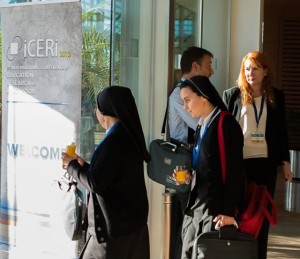Tonight I travelled to a small venue in Glebe to see a former colleague and a (different) former colleague’s wife perform in a double act. At the gig, I was hoping to see many of my colleagues from my former place of employment but other than my close friend and one other they were sadly absent. My friend and I like a bit of adventure and apparently crossing the Sydney Harbour Bridge is a bridge too far for most. We once went to Fairfield RSL to see a completely different colleague perform with his band and it seems that it was too far west for the rest of our colleagues. Tonight was a lot of fun – both of the performers are excellent musicians, and we even bought their CDs!
I was once berated for not doing enough for the school I was working at. It came out of the mouth of someone high up the sport hierarchy at the school and because I didn’t coach a sporting team, he figured I needed to become more involved. I asked if he knew what I actually did for the school and he avoided the question. In that particular year I coached a debating team, presented at three different major conferences in three different cities for the school, interviewed potential students on a weekend (and had my car smashed when I was rear-ended on the way home), ran professional development programs, wrote articles for journals as a representative of the school and more. But because I didn’t coach sport, I was considered to be not contributing enough.
Colleagues need to support each other. Not just in the staffroom when someone’s distress is right before your eyes or when a manager forces you into a meeting together, but as a courtesy, a responsibility, as a team. I’m not saying that every weekend you need to go out with a different colleague but when opportunities arise for a little adventure, to try something different, find out some other aspect about a colleague, take it when you can. It’s like when you go to the school musical and you find the brat in the corner of your classroom who if isn’t being disruptive, is falling asleep, has an amazing voice and the reason he falls asleep is that he is out performing every night to pay for his Mum’s medical needs.
My son is in Year 10 (not at my school) and he has mild autism and anxiety issues. He doesn’t pay much attention in class and combine that with literacy needs he tends to be a low performing student. It is a constant struggle at home to explain why it is important to do as he is asked by teachers and to pay attention. Last week he came home from the Swimming Carnival quite pleased with himself because he was the only entry in the IM 200m for his gender and age and he was told this week that he was runner-up for age champion. He thinks he will be going to the zone swimming carnival for the first time ever but none of us are sure of the rules. Another first, is that he is keenly paying attention in assemblies for announcements and constantly checking the sports noticeboard. I wonder if there are any teachers who see him differently now or if they just don’t care.
It is important they we see our students and colleagues as whole people and that teaching and working with others should be a holistic experience where we connect in a more profound way than our superficial exterior roles demands of us. We talk about schools as being a community but there is so much more we can do to help make it a truly supportive community that nurtures and cares for all of its members.




